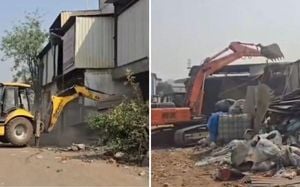Controversies surrounding healthcare and imports have sparked significant debates within Morocco, particularly focusing on the recent claims by Egyptian officials and the safety of imported goods. The Moroccan healthcare provider Akdital found itself at the center of these discussions after Egyptian Minister of Labor, Mohamed Gibran, surfaced allegations concerning the recruitment of 800 Egyptian nurses with attractive salaries. Akdital firmly rejected these claims, stating, "We have not signed any agreement with any foreign entity for the recruitment of nurses." This statement reflects the provider's acknowledgment of the existing staffing shortages within the Moroccan healthcare sector.
Despite the controversial claims from Egypt, Akdital revealed their recent recruitment strategy, stating they have successfully onboarded 4,000 Moroccan healthcare professionals through collaboration with the labor agency OFPPT and the program "Awrach" during the 2023-2024 period. This massive recruitment drive was aimed at bolstering their staffing needs across various clinics they have opened during this timeframe. "We will continue to invest in Moroccan healthcare, and between 2025 and 2026, we plan to open new clinics across different regions," said Akdital. The company reassured its commitment to prioritizing Moroccan nurses and paramedics, contradicting the notion of hiring significant foreign labor.
The allegations surrounding foreign nurses coincide with another pressing issue related to food safety—specifically concerning the quality of imported Algerian dates. Moroccan professionals working within the date industry have spoken out, ensuring consumers of the safety of Algerian dates sold locally. They emphasized, "Algerian dates contain no pesticides or carcinogenic substances harmful to the health of Moroccans," presenting themselves as advocates for consumer safety during the upcoming Ramadan season. The influx of imported dates just weeks before Ramadan has raised concerns among these professionals about the quality of such products, especially considering recent conversations about agricultural integrity.
Addressing these concerns, the Moroccan food and goods authority (ONSSA) has assured the public of its active role overseeing food safety, stating, "The ONSSA carries out the necessary inspections on imported dates." They are barring potentially harmful products from entering the market. Yet, Moroccan date professionals remain vigilant, pointing out discrepancies in the import processes, where standards require imported dates under five kilograms to be packed accordingly, yet they are being shipped from Algeria and elsewhere above this weight limit, hinting at underlying fraud within certification practices for these products.
The debate surrounding the importation of Algerian dates has reignited discussions about the necessity for Morocco to bolster its own date production amid the prevailing issues of drought and limited rainfall. Aiming for sustainability, Morocco's government has set ambitious targets to cultivate 300,000 tons of dates by 2030 as part of its agricultural renewal efforts. This included signing contracts with the local Federation for the date sector to plant five million date palms, demonstrating Morocco's strategy to secure its agricultural future against reliance on foreign imports.
Experts have noted the importance of adhering to international standards for pesticide residues. A specialist pointed out, "Residues of pesticides can be found on Algerian dates imported to Morocco." He highlighted the imperative nature of maintaining stringent controls by ONSSA to protect consumer health effectively. The need for quality assurance becomes particularly relevant against the backdrop of imports from countries like Tunisia, Algeria, Saudi Arabia, and the UAE, all of which must comply with responsible agricultural practices when exporting to Moroccan markets.
Both controversies—the recruitment of foreign healthcare professionals and the safety of food imports—pose challenges to the Moroccan government, businesses, and communities as they navigate the delicate balance between addressing local needs and ensuring public health. For Akdital, this means ramping up efforts to hire locally and invest strategically, fostering growth within national healthcare. Simultaneously, managing food safety and supporting local agricultural initiatives remain pressing priorities for Morocco as it seeks to reinforce its standing amid global pressures and neighborhood reliance on imports.
Morocco's complex relationship with both healthcare and food import sectors indicates not only the importance of flexibility and readiness to adapt but also highlights the broader issues affecting the nation as it seeks sustainable paths forward. The resonance of these controversies reflects the intertwined destinies of Morocco's healthcare and agricultural landscapes, creating both challenges and opportunities for the kingdom's development.



